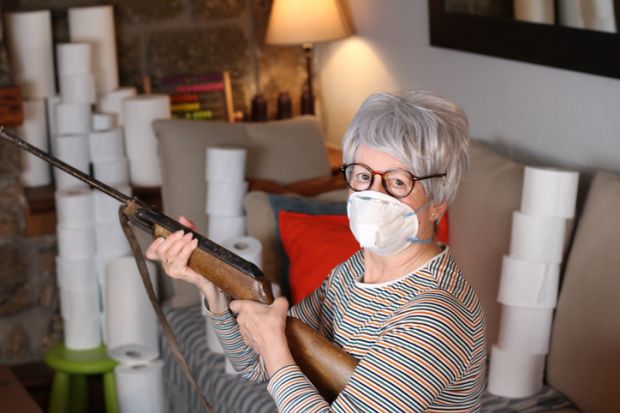Academic research on political polarisation often fails to acknowledge the extent to which social media can both reflect and also distort people’s attitudes, posits a book by Chris Bail, professor of sociology and public policy at Duke University in North Carolina, where he is also a director of the Polarisation Lab.
“There’s a kind of hubris that comes with data science,” he explained. While it was now possible to apply machine learning to vast amounts of data about social media use, he was worried that this provides us with “an incomplete picture of what is going on” because “Twitter gives a highly selective account of people’s lives”. It is only when we also bring in rich qualitative data about social media users that we can hope to understand the full story, he argued.
Breaking the Social Media Prism: How to Make Our Platforms Less Polarizing explores the results of such research. The book cites, for example, a prolific tweeter it calls “Ray”. Online, he specialised in “vile” excremental imagery such as “a long, snaking hose connected to a portable toilet on one side and a picture of Obama’s face on the other”. Offline, however, he was “one of the most polite and deferential people [we] interviewed” and he even “went out of his way to condemn political incivility”.
The best way of understanding this, argued Professor Bail, was to think about Twitter not as “a rational forum where we are going to have a competition of ideas”, but rather as a place we visit largely to “create and cultivate identities that make us feel good. Ray is an outcast in real life, but online he gets all this positive feedback.”
There are also strong forces on social media that tend to mute the voices of moderates. Professor Bail’s book cites the case of “Sara”, a “moderate Republican” who was subjected to vicious abuse when she tweeted in defence of people’s right to own guns.
This soon escalated into someone saying that “they hoped my daughter found our gun and shot me”, she explained in the book. When she tried to reach out to a liberal critic by pointing out they had both survived breast cancer, the only response was: “I hope you die.”
For someone with “the fairly nuanced political views” that Sara revealed in interviews, Professor Bail suggested, “fear of reprisals from extremists” acted as a strong incentive for keeping quiet about them.
More generally, social media acted more as a prism than a mirror for political attitudes, so that “looking online makes you misunderstand extremists as representative of the other side”. The many academics who operate largely within a leftist echo chamber, for example, got “a highly distorted portrait” of what conservatives are like in real life.
In his own case, Professor Bail recalled a “humbling experience” when he had been “highly sceptical” of something a Trump supporter had told him about Barack Obama, only for a fact-checking website to confirm that she was correct.
“We have a bit of a blind spot when these kinds of issue come up,” he reflected. “That is one of the things that frustrates people on the right: they feel unheard and that there’s a selective accounting of the truth…It is really important that academics don’t caricature people on the right.”
There were several reasons why, according to Professor Bail. For one, it already seemed “a little harder to get Republicans to participate in research”. Although a certain wariness of expressing contentious political views in class was probably inevitable in a highly polarised country, he suspected that “the concern is even stronger among conservative students…If students don’t feel they can discuss evidence in the classroom, that’s really concerning.”
Yet the most damaging result of “the social media prism” among academics, claimed Professor Bail, was when it led to some of them seeing “the other side as so unreasonable” that “depolarisation efforts just aren’t worth it”.
However, “most of the issues people in universities care most about, such as preventing racism, increasing awareness about climate change and so on – are fundamentally about winning hearts and minds. If we want to change people’s behaviour and make them less likely to discriminate based on race, casting off large sections of the population as simple racists is probably going to backfire.”
Register to continue
Why register?
- Registration is free and only takes a moment
- Once registered, you can read 3 articles a month
- Sign up for our newsletter
Subscribe
Or subscribe for unlimited access to:
- Unlimited access to news, views, insights & reviews
- Digital editions
- Digital access to THE’s university and college rankings analysis
Already registered or a current subscriber? Login








